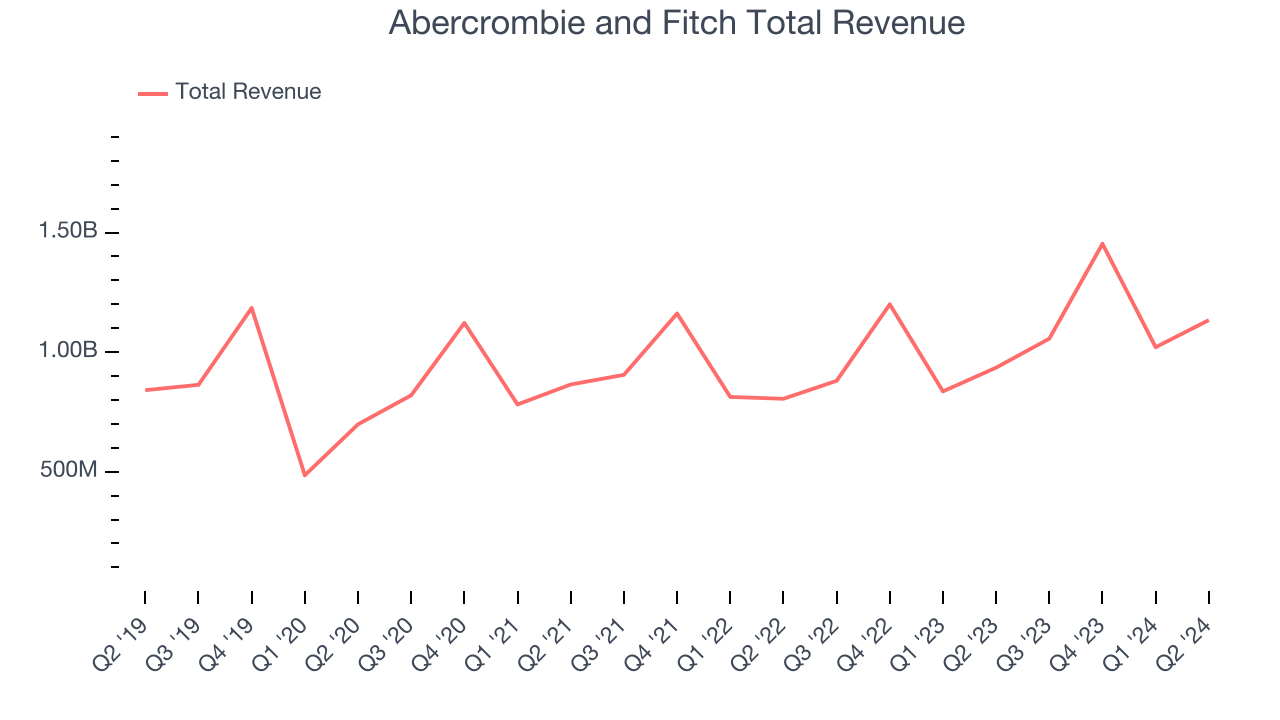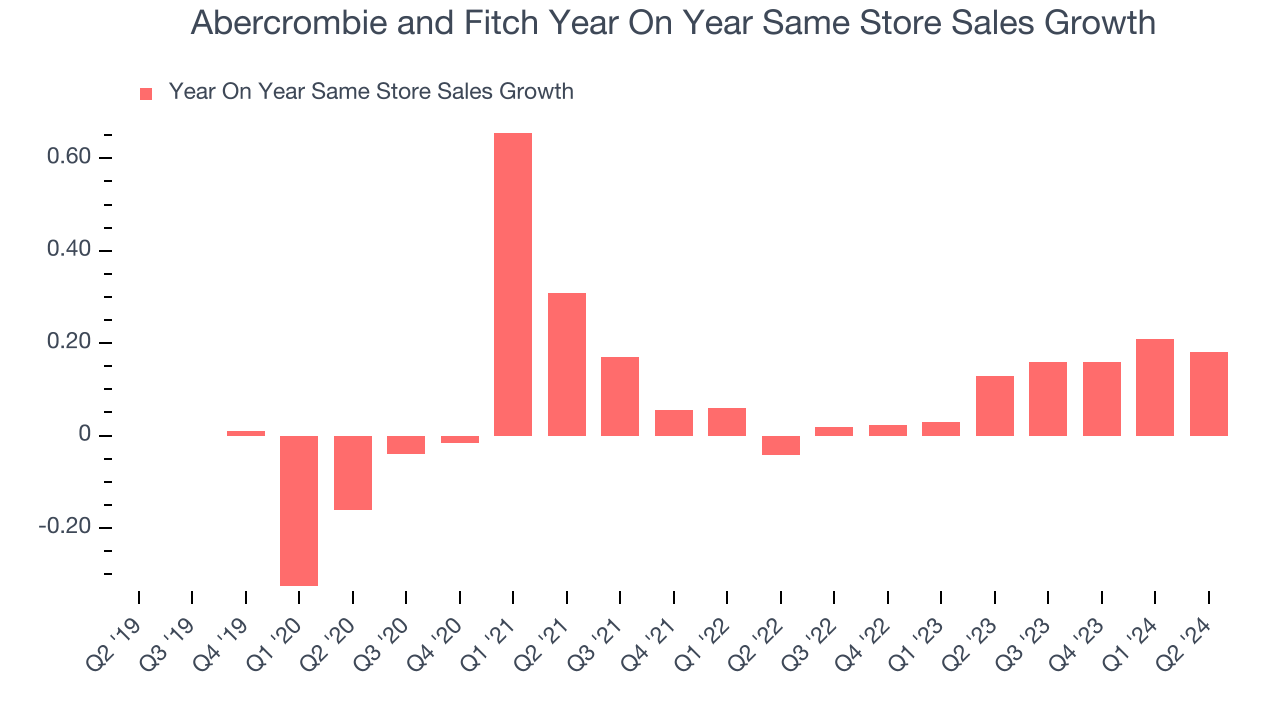Young adult apparel retailer Abercrombie & Fitch (NYSE:ANF) reported results ahead of analysts’ expectations in Q2 CY2024, with revenue up 21.2% year on year to $1.13 billion. It made a non-GAAP profit of $2.50 per share, improving from its profit of $1.10 per share in the same quarter last year.
Is now the time to buy Abercrombie and Fitch? Find out in our full research report.
Abercrombie and Fitch (ANF) Q2 CY2024 Highlights:
- Revenue: $1.13 billion vs analyst estimates of $1.09 billion (4.1% beat)
- EPS (non-GAAP): $2.50 vs analyst estimates of $2.22 (12.6% beat)
- Gross Margin (GAAP): 64.9%, up from 62.5% in the same quarter last year
- EBITDA Margin: 19%, up from 13.4% in the same quarter last year
- Same-Store Sales rose 18% year on year (13% in the same quarter last year)
- Market Capitalization: $8.51 billion
Fran Horowitz, Chief Executive Officer, said, “Our team continued to execute at a very high level in the second quarter, resulting in better than expected sales growth and profitability. The strength of our brand portfolio and improvements we’ve made in global capabilities resulted in broad-based growth across regions, brands and channels. The Americas led our performance this quarter with net sales growth of 23% on top of 19% growth last year, along with continued strong results in EMEA with growth of 16%. By brand, Abercrombie brands achieved growth of 26% on top of 26% growth last year, and Hollister continued its sequential acceleration to growth of 17% with better-than-expected summer and back-to-school selling. Consistent with the first quarter, we delivered improved profitability driven by gross profit rate expansion and operating leverage, with a second quarter operating margin of 15.5% and record second quarter operating income of $176 million."
Founded as an outdoor and sporting brand, Abercrombie & Fitch (NYSE:ANF) evolved to become a specialty retailer that sells its own brand of fashionable clothing to young adults.
Apparel Retailer
Apparel sales are not driven so much by personal needs but by seasons, trends, and innovation, and over the last few decades, the category has shifted meaningfully online. Retailers that once only had brick-and-mortar stores are responding with omnichannel presences. The online shopping experience continues to improve and retail foot traffic in places like shopping malls continues to stall, so the evolution of clothing sellers marches on.
Sales Growth
Abercrombie and Fitch is a mid-sized retailer, which sometimes brings disadvantages compared to larger competitors benefiting from better economies of scale. On the other hand, it has an edge over smaller competitors with fewer resources and can still flex high growth rates because it’s growing off a smaller base than its larger counterparts.
As you can see below, the company’s annualized revenue growth rate of 5.4% over the last five years was sluggish , but to its credit, it opened new stores and grew sales at existing, established stores.

This quarter, Abercrombie and Fitch reported remarkable year-on-year revenue growth of 21.2%, and its $1.13 billion in revenue topped Wall Street’s estimates by 4.1%. Looking ahead, Wall Street expects sales to grow 5.4% over the next 12 months, a deceleration from this quarter.
When a company has more cash than it knows what to do with, buying back its own shares can make a lot of sense–as long as the price is right. Luckily, we’ve found one, a low-priced stock that is gushing free cash flow AND buying back shares. Click here to claim your Special Free Report on a fallen angel growth story that is already recovering from a setback.
Same-Store Sales
A company’s same-store sales growth shows the year-on-year change in sales for its brick-and-mortar stores that have been open for at least a year, give or take, and e-commerce platform. This is a key performance indicator for retailers because it measures organic growth and demand.
Abercrombie and Fitch has generated solid demand for its products over the last two years. On average, the company’s same-store sales have grown by a healthy 11.4% year on year. This performance suggests that its steady rollout of new stores could be beneficial for shareholders. When a company has strong demand, more locations should help it reach more customers seeking its products.

In the latest quarter, Abercrombie and Fitch’s same-store sales rose 18% year on year. This growth was an acceleration from the 13% year-on-year increase it posted 12 months ago, which is always an encouraging sign.
Key Takeaways from Abercrombie and Fitch’s Q2 Results
We were impressed by how significantly Abercrombie and Fitch blew past analysts’ revenue and EPS estimates this quarter. On the other hand, its full-year capital expenditure forecast was a bit higher than expected. Overall, we think this was a solid quarter with some key areas of upside, but judging by the +10% share price move over the last 30 days, the market was likely hoping for more. The stock traded down 3.6% to $160.78 immediately after reporting.
So should you invest in Abercrombie and Fitch right now? When making that decision, it’s important to consider its valuation, business qualities, as well as what has happened in the latest quarter. We cover that in our actionable full research report which you can read here, it’s free.
